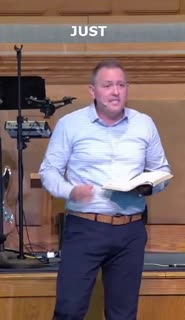Navigating Spiritual Challenges with Mercy and Grace
Devotional
Sermon Summary
Bible Study Guide
Sermon Clips
1. "The first thing to avoid the spiritual pitfall is to measure with mercy. Now, verse 37 is probably one of the most famous Bible verses quoted by unbelievers to tell Christians to back off, right? You know, judge not lest you be judged, right? And to be clear, he is condemning a spirit of judgmentalism in this passage. But if you think about it, Jesus is judging judgmentalism, amen? He's condemning condemnation. He's pronounced woes and blessings, and he's about to launch into a whole section about removing a log from your eye, which is saying there's sin in your life. And then he goes and says you can judge or tell the tree by its fruit, good and bad. So this is not an exhortation that we should remove all discernment from our lives, that laissez-faire, anything goes. Jesus is not a moral relativist, that whatever you believe is right for you, it's right for you. He's not a moral relativist. He's not a moral relativist. You is right for you, judge not lest you be judged. No, that's ripping this verse out of context." [10:28] (61 seconds)
2. "To overcome spiritual pitfalls, train in Christ -likeness. Now, at times, commentators look at these and say, boy, these thoughts feel very disjointed. Like, it feels like Jesus is over here, and then he's over there. And where is Jesus going? All these things. But you see, I don't think they are. Because there is a judgmental spirit of the blind guides in the first century that Jesus is especially... on the hunt against, right? He pronounces woes in the Sermon on the Plain, and he also pronounces woes in the Gospels, especially to the Pharisees and the scribes. And we looked at in Matthew's Gospel where, in particular, he calls the Pharisees the blind guys that leave people into pits. So I think there is a literal historical connection between the religious elite and the religious crowds that Jesus implicitly is often calling out in some of these passages." [21:10] (54 seconds)
3. "To overcome this spiritual pitfall, we must remove hypocrisy. Now, not unlike the parable of the unforgiving servant, Jesus takes these to the extreme. At times, they feel almost absurd, right? We have somebody walking around with a log. in their eye and somebody else has a little splinter a little speck a little sawdust in their eyes like let me help you with that and they're bludgeoning them right they're just banging them over the head with the log because wherever they turn this log is sticking out of their face broad as day bright as day right and Jesus says you hypocrites quit focusing on everybody else's eye specks and focus on your log first because here's the reality going back to our first point especially with measuring right we have this tendencies as human beings to always give ourselves the benefit of the doubt and to downplay our own shortcomings and rationalize explain away and then we always assume the worst of other people's photos don't like we always start to assume the worst and get judgy in our hearts and our minds and Jesus puts a mirror before us and he says you hypocrites quit focusing on everybody else's eye specks and focus on your log and he flips the script this is where he messes with us he said no no no no no no you have the log they have the speck now he speaks that over the whole world so follow me here everybody has logs and everybody has specks don't we right we all do but when I'm focused on helping others the first thing I need to do is remove the hypocrisy from my own life and focus in the mirror on the log not on the speck and others now similar to the measuring he doesn't say therefore never go after a speck ever in someone else's life now he says once you remove the hypocrisy now you're ready to help somebody with the speck in their eye but not before this is a spiritual pitfall where we're on the sin hunt for other people's faults when we're never willing to deal with our own" [36:36] (60 seconds)
4. "The miracle there on Mount Baldy. But there's a greater miracle, brothers and sisters, that Jesus has overcome on your behalf. It's a miracle that happened in Jerusalem on Mount Zion, on a hilltop far, far away, where Jesus wasn't in the pit simply for three hours, but for three days. He was dead, dead as dead could be, and he went into that pit, for you and for me. And he didn't fall into that pit. He cast himself into that pit willingly so that he might taste death for you and for me, and to take all the splinters and all the logs and all the condemnation and all the judgmentalism of the world. The blind led him there willingly, but he, with perfect eyesight, knew exactly where he was going. He cast himself into the pit, and he rested. He rescued himself out of the pit, because the pangs of death could not hold him. Amen?" [38:41] (60 seconds)
Ask a question about this sermon
2. "To overcome spiritual pitfalls, train in Christ -likeness. Now, at times, commentators look at these and say, boy, these thoughts feel very disjointed. Like, it feels like Jesus is over here, and then he's over there. And where is Jesus going? All these things. But you see, I don't think they are. Because there is a judgmental spirit of the blind guides in the first century that Jesus is especially... on the hunt against, right? He pronounces woes in the Sermon on the Plain, and he also pronounces woes in the Gospels, especially to the Pharisees and the scribes. And we looked at in Matthew's Gospel where, in particular, he calls the Pharisees the blind guys that leave people into pits. So I think there is a literal historical connection between the religious elite and the religious crowds that Jesus implicitly is often calling out in some of these passages." [21:10] (54 seconds)
3. "To overcome this spiritual pitfall, we must remove hypocrisy. Now, not unlike the parable of the unforgiving servant, Jesus takes these to the extreme. At times, they feel almost absurd, right? We have somebody walking around with a log. in their eye and somebody else has a little splinter a little speck a little sawdust in their eyes like let me help you with that and they're bludgeoning them right they're just banging them over the head with the log because wherever they turn this log is sticking out of their face broad as day bright as day right and Jesus says you hypocrites quit focusing on everybody else's eye specks and focus on your log first because here's the reality going back to our first point especially with measuring right we have this tendencies as human beings to always give ourselves the benefit of the doubt and to downplay our own shortcomings and rationalize explain away and then we always assume the worst of other people's photos don't like we always start to assume the worst and get judgy in our hearts and our minds and Jesus puts a mirror before us and he says you hypocrites quit focusing on everybody else's eye specks and focus on your log and he flips the script this is where he messes with us he said no no no no no no you have the log they have the speck now he speaks that over the whole world so follow me here everybody has logs and everybody has specks don't we right we all do but when I'm focused on helping others the first thing I need to do is remove the hypocrisy from my own life and focus in the mirror on the log not on the speck and others now similar to the measuring he doesn't say therefore never go after a speck ever in someone else's life now he says once you remove the hypocrisy now you're ready to help somebody with the speck in their eye but not before this is a spiritual pitfall where we're on the sin hunt for other people's faults when we're never willing to deal with our own" [36:36] (60 seconds)
4. "The miracle there on Mount Baldy. But there's a greater miracle, brothers and sisters, that Jesus has overcome on your behalf. It's a miracle that happened in Jerusalem on Mount Zion, on a hilltop far, far away, where Jesus wasn't in the pit simply for three hours, but for three days. He was dead, dead as dead could be, and he went into that pit, for you and for me. And he didn't fall into that pit. He cast himself into that pit willingly so that he might taste death for you and for me, and to take all the splinters and all the logs and all the condemnation and all the judgmentalism of the world. The blind led him there willingly, but he, with perfect eyesight, knew exactly where he was going. He cast himself into the pit, and he rested. He rescued himself out of the pit, because the pangs of death could not hold him. Amen?" [38:41] (60 seconds)




